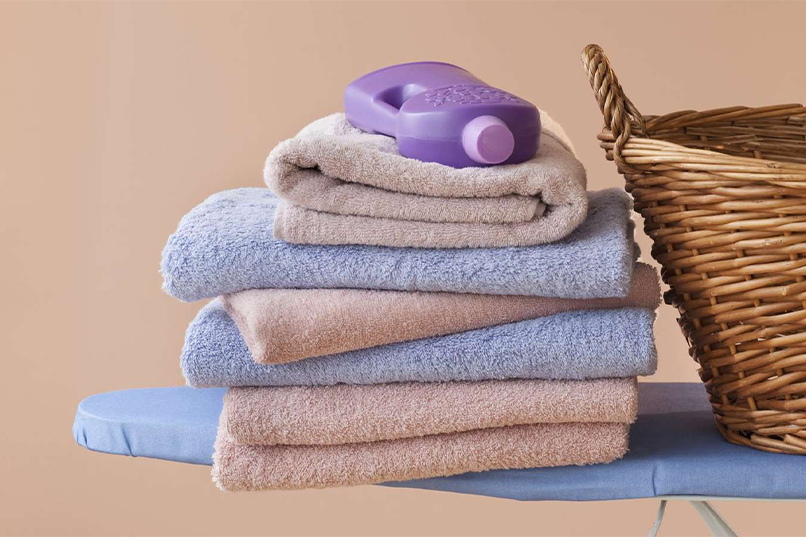Towel care 101 – Tips and tricks for maintaining fresh, fluffy towels!
There’s nothing quite like stepping out of a warm shower or bath and wrapping yourself in a fresh, clean towel. But over time, even the most luxurious towels can start to feel scratchy, stiff, and dingy. That’s because towels are subjected to a lot of wear and tear, as well as exposure to moisture, bacteria, and other contaminants. In order to keep your towels looking and feeling their best, it’s important to know how and when to wash them.

Why Towels Get Dirty
First, let’s talk about why towels get dirty in the first place. When you use a towel to dry off after a shower or bath, it picks up dead skin cells, oils, and other bodily fluids. These substances can create a breeding ground for bacteria and other microbes, which can cause odors and even skin infections if left unchecked. Towels can also be exposed to other sources of dirt and grime, such as makeup, hair products, and household cleaners.
When to Wash Your Towels
So, how often should you wash your towels? The answer depends on a few factors, including how often you use them, how many people are using them, and how humid your bathroom is. In general, it’s a good idea to wash your towels at least once a week. If you live in a humid climate, you may need to wash them more frequently to prevent mildew and odors.
If you’re using a towel to dry off after a workout or other physical activity, you should wash it after each use. The same goes for towels that are used by multiple people, such as hand towels in a guest bathroom. In these cases, it’s important to prevent the spread of bacteria and other germs.
How to Wash Your Towels
Now that you know when to wash your towels, let’s talk about how to do it. The good news is that washing towels is fairly straightforward, and you don’t need any special equipment or products. Here’s a step-by-step guide…
Step 1: Sort your towels. Separate white towels from colored towels to prevent color bleeding.
Step 2: Choose a detergent. Use a detergent that is free from dyes and fragrances, as these can irritate sensitive skin. If you have hard water, you may want to add a water softener to your wash cycle to help keep your towels soft.
Step 3: Use the right temperature. Towels can be washed in warm or hot water, depending on how dirty they are. Hot water is more effective at killing bacteria, but it can also cause towels to shrink or fade. Warm water is a good compromise.
Step 4: Add vinegar. If your towels are particularly smelly or dingy, you can add a cup of white vinegar to the wash cycle. This will help to break down any bacteria and deodorize the towels.
Step 5: Avoid fabric softener. Fabric softener can make towels feel soft and fluffy, but it can also leave a residue that reduces absorbency. Instead, add a quarter cup of baking soda to the wash cycle to help freshen the towels.
Step 6: Dry thoroughly. Towels should be dried completely to prevent mildew and odors. You can tumble dry them on a low heat setting, or hang them outside to dry in the sun.

Tips for Keeping Towels Fresh
In addition to washing your towels regularly, there are a few other things you can do to keep them fresh and fluffy…
- Hang them up: After each use, hang your towels up to dry rather than leaving them in a pile on the floor or in a damp heap on the back of a door. This will help to prevent mildew and odors.
- Don’t overload the washer: Make sure you don’t overload your washer when washing your towels, as this can prevent them from getting fully clean. If your towels are particularly dirty or you have a lot of them to wash, it may be better to split them into two loads.
- Avoid bleach: While bleach can help to whiten towels, it can also weaken the fibers and cause them to deteriorate more quickly. If you want to whiten your towels, try using hydrogen peroxide instead.
- Use a towel rack: Instead of throwing your towels in a pile, use a towel rack or hooks to hang them up. This will allow air to circulate around them and help them dry more quickly.
- Wash towels separately: Try to avoid washing towels with other types of laundry, as this can cause lint and other debris to accumulate on them. If you do need to wash them with other items, make sure to use a gentle cycle and avoid overloading the washer.
- Avoid fabric softeners: As mentioned earlier, fabric softeners can leave a residue on towels that reduces their absorbency. Instead, try using wool dryer balls or adding a quarter cup of white vinegar to the rinse cycle to help soften your towels.







